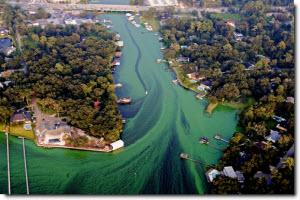The Effects: Economy

 Nutrient pollution negatively impacts tourism.
Nutrient pollution negatively impacts tourism. Nutrient pollution has diverse and far-reaching effects on the U.S. economy, impacting tourism, property values, commercial fishing, recreational businesses and many other sectors that depend on clean water.
Drinking water costs
Nitrates and algal blooms in drinking water sources can drastically increase treatment costs. For example, nitrate-removal systems in Minnesota caused supply costs to rise from 5-10 cents per 1000 gallons to over $4 per 1000 gallons.
It can also cost billions of dollars to clean up polluted water bodies. Every dollar spent on protecting sources of drinking water saves in water treatment costs.
Tourism losses
The tourism industry loses close to $1 billion each year, mostly through losses in fishing and boating activities, as a result of water bodies that have been affected by nutrient pollution and harmful algal blooms.
Airborne nutrient pollution can also affect visibility at popular outdoor destinations like national parks. This kind of pollution can also damage buildings and other structures, especially those made of marble and limestone.
Commercial fishing and shellfish losses
Fishing and shellfish industries are hurt by harmful algal blooms that kill fish and contaminate shell fish. Annual losses to these industries from nutrient pollution are estimated to be in the tens of millions of dollars.
Real estate losses
Clean water can raise the value of a nearby home by up to 25 percent. Waterfront property values can decline because of the unpleasant sight and odor of algal blooms.
